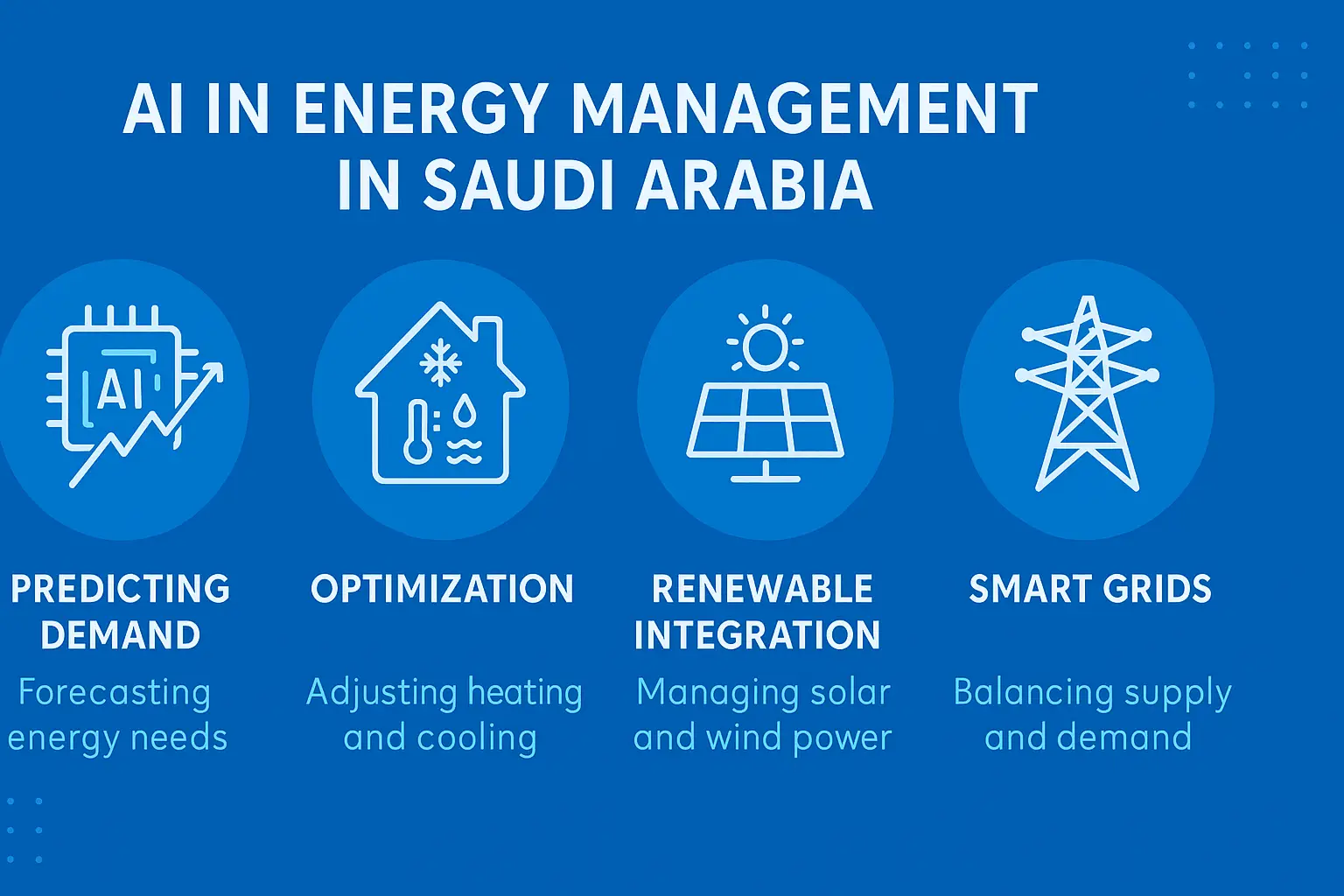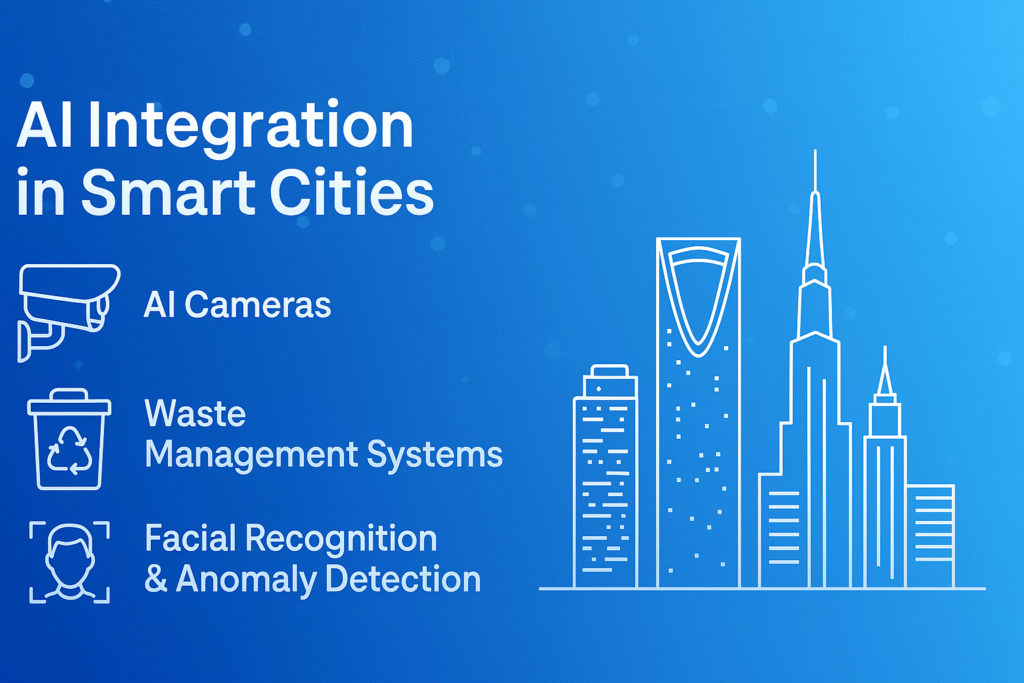AI and Sustainability in Saudi Arabia: Driving Urban Transformation Under Vision 2030
AI and Sustainability in Saudi Arabia
Saudi Arabia’s Vision 2030 is an ambitious plan aimed at transforming the Kingdom into a diversified, technology-driven economy. A central focus of this transformative vision is sustainability, with an emphasis on building smart cities that incorporate the latest in digital and AI-powered solutions. As the world moves toward urbanization and the challenges of sustainability become more pressing, Saudi Arabia is positioning itself to lead the way in integrating Artificial Intelligence (AI) to address environmental concerns and improve the quality of urban life. AI-powered solutions are a vital component of Saudi Arabia’s strategy to create sustainable urban living environments, aligning with the goals of Vision 2030.
The Role of AI in Urban Sustainability
Artificial Intelligence (AI) is revolutionizing the way cities manage resources, interact with citizens, and plan for the future. AI’s potential in urban sustainability lies in its ability to analyze vast amounts of data, automate processes, and optimize systems in real time. This is crucial in urban planning, resource management, energy efficiency, transportation systems, waste management, and climate action — all of which are fundamental aspects of Vision 2030.
In Saudi Arabia, AI technologies are being utilized to create smart cities that not only reduce environmental impact but also enhance the well-being of residents. The integration of AI in urban development is poised to tackle challenges such as pollution, traffic congestion, energy consumption, and waste management. The ultimate goal is to provide a high quality of life while minimizing the ecological footprint.
AI and Sustainability in Saudi Arabia

One of the most prominent projects in Saudi Arabia under Vision 2030 is the development of NEOM, a futuristic city located on the Red Sea coast. NEOM is being designed as a model of AI-powered sustainable urban living. The city will feature smart infrastructure, autonomous transportation, and AI-driven services that optimize everything from energy use to waste management.
Key Features of NEOM’s AI-Powered Smart City:
- Energy Efficiency: AI will optimize energy consumption across the city by managing lighting, air conditioning, and heating systems in real-time based on weather conditions and occupancy. AI systems will also monitor renewable energy sources, such as solar and wind, ensuring that the city runs on sustainable energy while minimizing waste.
- Autonomous Vehicles: NEOM will feature autonomous electric vehicles (EVs) that will reduce traffic congestion and pollution. AI will control the fleet of vehicles to ensure efficient routing, reducing energy consumption and greenhouse gas emissions.
- Smart Grids: The city will integrate AI in its energy grid, allowing for real-time adjustments to match supply with demand. This will prevent energy waste and make the grid more resilient, especially as the city grows.
- Waste Management: AI will help NEOM manage waste in an environmentally friendly manner. AI-powered systems will track waste generation, sort recyclables, and ensure that waste is properly disposed of or repurposed into new materials.
- Urban Farming and Food Security: In line with sustainable living goals, AI will be used in urban farming projects to maximize land use and improve food security. AI will monitor climate conditions, optimize irrigation, and analyze crop data to ensure high yields and minimal resource waste.
AI in Resource Management
AI is also being deployed in Saudi cities to improve resource management and reduce waste. The Saudi Data and Artificial Intelligence Authority (SDAIA) is leading efforts to promote AI in various industries, including resource management, in line with Vision 2030.
Water Management:
Saudi Arabia faces significant water scarcity challenges, making efficient water management a priority. AI-powered solutions can optimize water distribution by predicting demand and reducing wastage. Smart meters equipped with AI can detect leaks in the system, enabling prompt repairs and ensuring that water is not wasted.
Energy Consumption:
AI algorithms are being applied to predict energy demand patterns and adjust energy distribution accordingly. These predictive models are crucial for balancing the supply and demand of electricity, especially in a country like Saudi Arabia that has extreme climate conditions. The use of AI ensures that energy is used efficiently and that cities rely more on renewable sources.
Waste Management:
With the population growth in urban areas, waste management has become a significant challenge. AI solutions, such as smart bins and waste sorting robots, help optimize waste collection schedules and ensure that recyclable materials are separated efficiently. These innovations are not only eco-friendly but also cost-effective, improving the overall waste management system.
AI-Powered Transportation for Sustainable Mobility
Transportation is a key area in Saudi Arabia’s efforts to reduce carbon emissions and improve sustainability. AI-powered transportation systems, such as autonomous electric vehicles and smart traffic management, will play a central role in achieving Vision 2030’s goals for greener cities.
- Smart Traffic Systems: AI is being integrated into Saudi cities’ traffic management systems to reduce congestion and improve air quality. Smart traffic lights, powered by AI, adjust their timing based on real-time traffic conditions, minimizing delays and reducing fuel consumption.
- Electric and Autonomous Vehicles: As part of Vision 2030, Saudi Arabia is working towards the widespread adoption of electric and autonomous vehicles. AI plays a pivotal role in ensuring the safety and efficiency of these vehicles. By optimizing routes, predicting traffic patterns, and controlling vehicle systems, AI helps reduce emissions and energy consumption.
AI in Environmental Monitoring and Climate Action

AI is not only being used to optimize urban life but also to monitor and address the environmental impacts of urbanization. Environmental sensors powered by AI will monitor air quality, noise levels, and temperature variations in real-time, enabling authorities to take swift action to reduce pollution.
Furthermore, AI can be applied in climate modeling to predict weather patterns, track environmental changes, and inform policies aimed at mitigating the effects of climate change. AI technologies will also help in managing the Kingdom’s renewable energy projects, ensuring that solar and wind power are effectively utilized to reduce dependency on fossil fuels.
Vision 2030: Empowering Sustainable Urban Living
AI plays a crucial role in Saudi Arabia’s Vision 2030 initiative, providing solutions to the Kingdom’s urban sustainability challenges. The integration of AI-powered systems into urban planning, energy management, transportation, waste management, and climate monitoring is transforming Saudi cities into more sustainable, efficient, and livable environments.
As Saudi Arabia moves forward with its Vision 2030, the development of AI-powered smart cities such as NEOM is setting the stage for a new era of sustainable urban living. These cities will not only reduce environmental impact but will also enhance the quality of life for residents, creating a model for other countries to follow in their quest for sustainable urban development.
Conclusion
The future of urban living in Saudi Arabia is being shaped by AI-powered solutions that foster sustainability, reduce environmental impact, and improve urban efficiency. Through strategic initiatives like NEOM and the implementation of AI in resource management, transportation, and climate action, Saudi Arabia is paving the way for a greener, smarter, and more sustainable future. As Vision 2030 progresses, the Kingdom is setting a global example of how AI can be harnessed to create smart, sustainable cities that prioritize the well-being of both the people and the planet.


